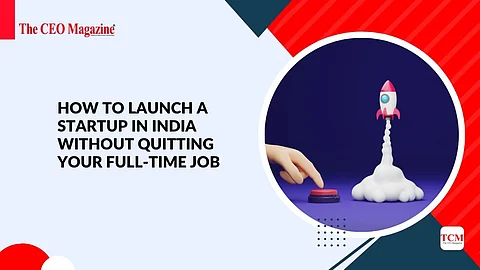
- News
- Women
- Magazine
- IndustryIndustry
- InsightsInsights
- Success Stories
- PublishPublish
- ContactContact
- Media KitMedia Kit

Launch a Startup in India
Imagine this…
You’re sitting at your office desk, reviewing your boss’s agenda, but your mind keeps drifting back to that idea.
The one you believe in.
The one that keeps you up at night.
The one that might just change your life.
But there’s a catch — you’ve got bills to pay, family to support, and no safety net.
So you ask yourself: Can I really launch a startup in India without quitting my job?
Short answer: Yes.
Long answer: Let me show you how.
“Don’t burn the boat. Build a bridge.”
That’s the philosophy I’ve followed — and it’s the one I want to share with you.
Before we dive into the how, let’s talk about the why.
Starting your own business while employed:
Reduces financial risk
Builds discipline and time-management skills
Gives you space to validate your idea
Creates leverage if you ever need to raise funding or quit later
In India’s fast-growing startup ecosystem, with platforms like Startup India, Atal Innovation Mission, and growing investor interest in bootstrapped models, it’s entirely possible to grow your venture slowly — and strategically — on the side.
Here’s the secret:
You don’t need a fancy office, 10 employees, or a ₹50 lakh funding round to be a founder.
You need:
One solid problem to solve
One clear customer persona
And a mindset of testing, learning, and improving
Pick a problem you’ve personally faced — this creates emotional drive.
Use evenings/weekends to research your audience and competitors.
Launch your MVP (Minimum Viable Product) before quitting your job.
“The best startups don’t begin with scale. They begin with service.”
— Ash Maurya
Too many founders start broad: “I want to build an edtech app for students.”
Try this instead:
“I’m building a mobile-first app for CBSE Class 10 students in Tier 2 cities preparing for Science boards.”
See the difference?
Focus builds clarity. Clarity builds speed.
Who exactly am I serving?
What’s the single biggest frustration they face?
What solution can I deliver with my limited time?
Real Example:
Ajay, a full-time software engineer in Pune, launched a WhatsApp-based career guidance tool for students — monetized through paid consultations. Today, it’s a growing SaaS platform.
Time is your most limited resource.
If you’re serious about launching a startup while working full-time, you’ll need to treat your after-hours like gold.
Wake up 90 minutes earlier — build before the world wakes.
Use your commute for podcasts, audiobooks, or strategy planning.
Block 2–3 weekly time slots (90 mins each) solely for your startup work.
“If you wait for perfect conditions, you’ll never build anything meaningful.”
— Paul Graham
Tool Tip:
Use productivity tools like Notion, Trello, and Google Calendar. Track your tasks like you track your salary.
One of the biggest mistakes I see?
Founders spend months building something without testing whether anyone wants it.
Create a simple landing page (via Carrd or Wix)
Run targeted Instagram or LinkedIn polls
Offer a free consultation, download, or webinar to collect emails
Build an Instagram or LinkedIn page and see if people engage
Pro Tip:
If you can get 10 strangers to pay (or even sign up) for your product/service, you’re onto something.
Here’s the truth:
You don’t need to register a company on Day 1.
Focus first on:
Testing your idea
Building a customer base
Generating first revenue
When you're ready:
Start as a sole proprietor or register a Private Limited Company via MCA (Ministry of Corporate Affairs)
Use platforms like IndiaFilings or VakilSearch to speed up the process
Don’t ignore your employer’s contract — ensure no conflicts of interest
“Start fast. Formalise later — but don’t ignore the law.”
— Ankur Warikoo
You don’t need to know how to code to launch a product.
Today’s low-code/no-code tools are founder-friendly and affordable.
Webflow / Wix / Carrd – Build beautiful websites
Notion / Airtable – Manage data and operations
Zapier / Make – Automate tasks
Shopify / Instamojo – Sell digital or physical products
If you’re a non-tech founder, you now have zero excuses.
Here’s a harsh truth:
In India, trust builds traction.
People will Google you before they buy from your startup.
Share your journey on LinkedIn, X (Twitter), or YouTube
Post weekly learnings, challenges, and milestones
Highlight your vision — not just your product
Example:
Tanmay Bhat grew an edtech community while simply documenting what he was learning.
Let me be honest — don’t romanticize quitting your job.
Quitting only makes sense if:
Your startup is generating steady income
You’ve built a strong customer base or traction
You have 6–12 months of personal runway
You can’t grow further without full-time focus
Otherwise, keep building in stealth mode.
Remember: Google started in a garage. Yours can start in your guest bedroom.
Kunal Shah (Cred): Built Freecharge while consulting for other companies
Varun Duggirala: Co-founder of The Glitch, started his podcast while running a media agency
Shradha Sharma (YourStory): Built her media startup while juggling NDTV assignments
“Every night, I wrote 1 story. By the end of the year, I had 300 stories and a startup.”
— Shradha Sharma
You don’t need to quit everything to start something.
What you need is:
A clear why
A small window of time daily
The courage to test, fail, and iterate
Launching a startup in India while working full-time isn’t just possible — it’s smart.
It forces you to be resourceful, humble, and focused.
So take the first step — tonight.
Sketch your idea. Message your first potential user. Write that first post.
The founder in you doesn’t need permission. Just a plan.
Follow us on Google News
